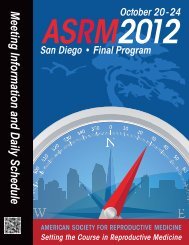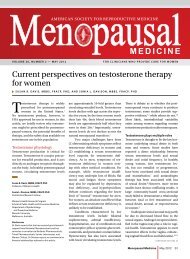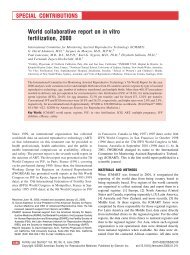scientific program • symposia - American Society for Reproductive ...
scientific program • symposia - American Society for Reproductive ...
scientific program • symposia - American Society for Reproductive ...
You also want an ePaper? Increase the reach of your titles
YUMPU automatically turns print PDFs into web optimized ePapers that Google loves.
SCIENTIFIC PROGRAM <strong>•</strong> INTERACTIVE SESSIONS<br />
Tuesdasy, October 18, 2011 1:15 pm – 2:15 pm<br />
Contraception Day Interactive Session<br />
ADOLESCENT CONTRACEPTON: DEPOT MEDROXY-<br />
PROGESTERONE ACETATE VS. IUDs. AN INTERACTIVE DEBATE.<br />
Presented by the Contraception Special Interest Group<br />
Jeffrey T. Jensen, M.D., M.P.H. (Chair)<br />
Oregon Health & Science University<br />
Andrew Kaunitz, M.D.<br />
University of Florida College of Medicine-Jacksonville<br />
Steven J. Sondheimer, M.D.<br />
University of Pennsylvania School of Medicine<br />
Needs Assessment and Description<br />
Contraception is identified as an important and relevant<br />
topic area of the ASRM, and there is a strong demand<br />
<strong>for</strong> small sessions focused on interactive clinical case<br />
discussions. Members of the Contraceptive Special Interest<br />
Group identified the topic of adolescent pregnancy as a<br />
top priority. A literature review and in<strong>for</strong>mation from the<br />
most recent National Survey of Family Growth suggest that<br />
long-acting methods of contraception are underutilized in<br />
adolescents. The United States has the highest rate of teen<br />
pregnancy among more developed nations. Despite the<br />
availability of highly effective long-acting contraceptive<br />
methods, many health care providers have questions<br />
about safety and side-effect profiles that limit the use of<br />
long-acting methods in young women. The commonly used<br />
injectable, depot medroxyprogesterone acetate (DMPA),<br />
has been linked to poor bone health and weight gain.<br />
Intrauterine devices (IUDs) are highly effective long-acting<br />
options, but their use has been discouraged in adolescents<br />
due to concerns about infection and infertility. This debate<br />
will provide an attractive and highly interactive <strong>for</strong>mat to<br />
review the data on these methods in teens.<br />
Learning Objectives<br />
At the conclusion of this session, participants should be able<br />
to:<br />
1. Discuss the data on depot medroxyprogesterone acetate<br />
(DMPA) and bone health.<br />
2. Compare the expected bleeding patterns between<br />
DMPA, the copper IUD, and the levonorgestrel intrauterine<br />
system (LNG IUS).<br />
3. Discuss differences between the copper IUD and the LNG<br />
IUS and counsel patients about contraceptive benefits<br />
and bleeding patterns with this system.<br />
4. Critique the literature on weight effects of DMPA in<br />
adolescents.<br />
5. Summarize the effects of IUD use on pelvic infection and<br />
infertility.<br />
Room 230 A/B<br />
87<br />
ACGME COMPETENCY<br />
Medical Knowledge<br />
Patient Care<br />
TEST QUESTION:<br />
1. A 16-year-old female presents <strong>for</strong> contraceptive<br />
counseling. She had an abortion three weeks ago after<br />
a failure while using oral contraceptives. She admits that<br />
she was not always a reliable pill taker, but is reluctant<br />
to consider other options. She does not want a device<br />
or implant, and is worried about side effects with depot<br />
medroxyprogesterone acetate (DMPA). After participating<br />
in this session, in my practice I would counsel this patient<br />
that:<br />
A. Irreversible bone loss develops in adolescents but not in<br />
adults.<br />
B. Calcium supplementation and diet have no impact on<br />
bone density in adolescents.<br />
C. Early weight gain with DMPA predicts subsequent weight<br />
gain.<br />
D. DMPA is as effective as a contraceptive implant.<br />
E. Not applicable to my area of practice.<br />
2. A 15-year-old sexually active female comes to your<br />
office requesting contraception. She has a history of a prior<br />
ectopic pregnancy that was treated medically. She does<br />
not want any type of oral daily regimen or barrier method<br />
and requests an IUD. Physical examination is normal and her<br />
body mass index is 30 kg/m 2 . Upon speculum examination,<br />
you note a muco-purulent cervical discharge. After<br />
participating in this session, in my practice I would counsel<br />
this patient that an IUD cannot be placed at this time<br />
because she:<br />
A. Has a history of ectopic pregnancy.<br />
B. Is under age 16.<br />
C. Has muco-purulent discharge from the cervix.<br />
D. Is obese.<br />
E. Not applicable to my area of practice.








